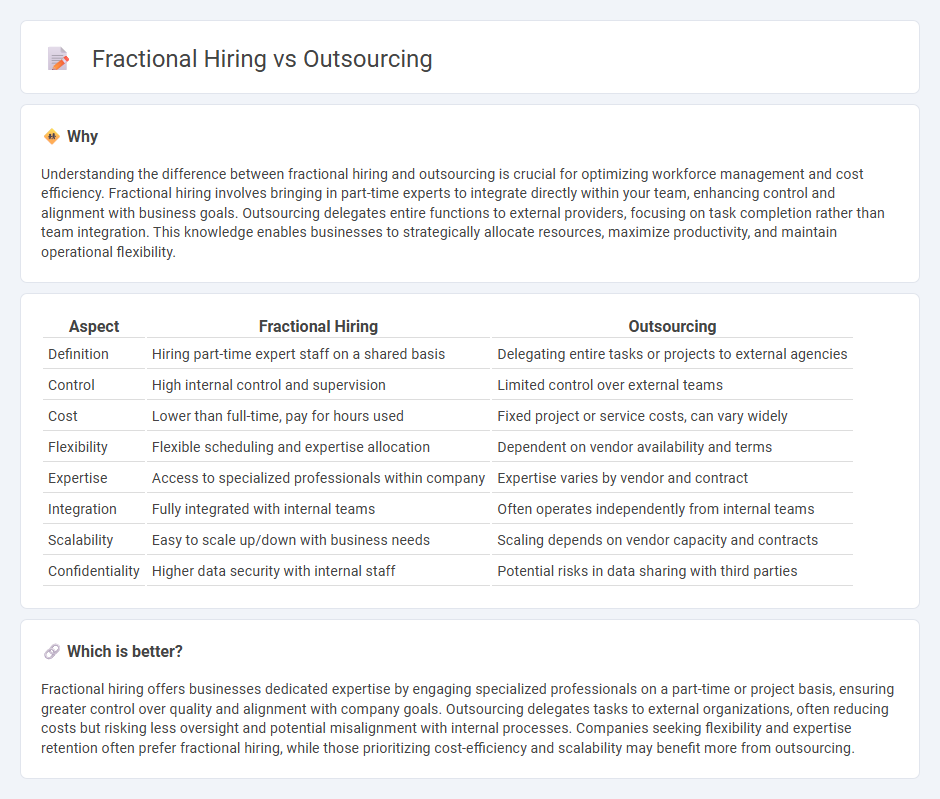
Fractional hiring offers businesses access to specialized professionals on a part-time or project basis, ensuring customized expertise without full-time commitments. Outsourcing involves delegating entire functions or projects to external agencies, often focusing on cost efficiency and scalability. Explore the advantages and applications of each approach to optimize your employment strategy.
Why it is important
Understanding the difference between fractional hiring and outsourcing is crucial for optimizing workforce management and cost efficiency. Fractional hiring involves bringing in part-time experts to integrate directly within your team, enhancing control and alignment with business goals. Outsourcing delegates entire functions to external providers, focusing on task completion rather than team integration. This knowledge enables businesses to strategically allocate resources, maximize productivity, and maintain operational flexibility.
Comparison Table
| Aspect | Fractional Hiring | Outsourcing |
|---|---|---|
| Definition | Hiring part-time expert staff on a shared basis | Delegating entire tasks or projects to external agencies |
| Control | High internal control and supervision | Limited control over external teams |
| Cost | Lower than full-time, pay for hours used | Fixed project or service costs, can vary widely |
| Flexibility | Flexible scheduling and expertise allocation | Dependent on vendor availability and terms |
| Expertise | Access to specialized professionals within company | Expertise varies by vendor and contract |
| Integration | Fully integrated with internal teams | Often operates independently from internal teams |
| Scalability | Easy to scale up/down with business needs | Scaling depends on vendor capacity and contracts |
| Confidentiality | Higher data security with internal staff | Potential risks in data sharing with third parties |
Which is better?
Fractional hiring offers businesses dedicated expertise by engaging specialized professionals on a part-time or project basis, ensuring greater control over quality and alignment with company goals. Outsourcing delegates tasks to external organizations, often reducing costs but risking less oversight and potential misalignment with internal processes. Companies seeking flexibility and expertise retention often prefer fractional hiring, while those prioritizing cost-efficiency and scalability may benefit more from outsourcing.
Connection
Fractional hiring and outsourcing are connected through their shared goal of providing businesses with flexible workforce solutions that optimize cost-efficiency and specialized expertise. Fractional hiring allows companies to engage part-time professionals for strategic roles, while outsourcing delegates entire business functions to external service providers. Both approaches enable organizations to scale talent resources dynamically without the long-term commitment of full-time employment.
Key Terms
Cost Efficiency
Outsourcing reduces operational expenses by delegating tasks to external vendors, often leveraging lower labor costs and eliminating overhead associated with full-time employees. Fractional hiring offers cost efficiency by engaging specialized professionals on a part-time basis, allowing companies to access expert skills without committing to full salaries and benefits. Explore deeper insights to determine which strategy maximizes your business's cost efficiency.
Talent Access
Outsourcing provides companies with access to specialized talent pools globally, enabling scalability and cost efficiency across various projects. Fractional hiring offers targeted expertise by engaging part-time professionals, allowing businesses to fill specific skill gaps without committing to full-time roles. Discover how these talent access strategies can optimize your workforce and drive growth.
Control & Integration
Outsourcing offers limited control and integration as tasks are managed externally, often leading to less alignment with internal processes and company culture. Fractional hiring provides greater control and seamless integration by embedding experienced professionals into the team on a part-time basis, ensuring direct communication and collaborative workflows. Explore how these models impact your business strategy to optimize performance and resource management.
Source and External Links
What Is Outsourcing? (Including Types and Advantages) | Indeed.com - Outsourcing is the business practice of hiring external companies or contractors to perform tasks or business functions, such as customer support, accounting, or engineering, to reduce costs and increase efficiency.
What is Outsourcing and How Does it Work? - TechTarget - Outsourcing involves contracting a third party to perform tasks or services either onsite or remotely and emphasizes the importance of managing the partnership and contract terms effectively for successful outcomes.
What is Outsourcing? Definition, Advantages, and Examples - Outsourcing helps companies save costs, focus on core business activities, and access specialized expertise, though it can also present challenges such as communication issues and economic impacts.
 dowidth.com
dowidth.com